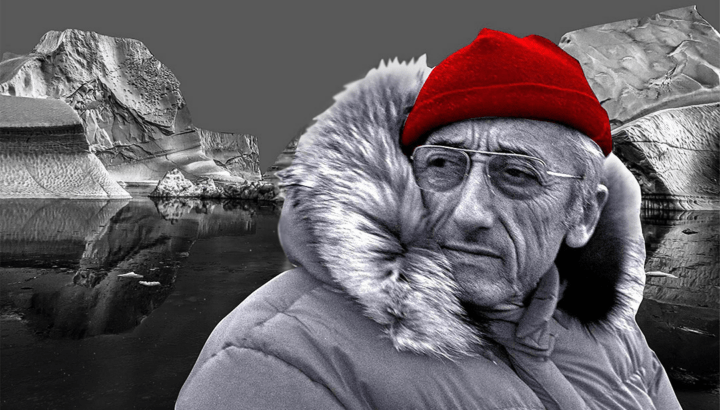
Jacques Cousteau: Dive with Noble Purpose
“The sea, once it casts its spell, holds one in its net of wonder forever.” Jacques Cousteau In an era when technology was beginning to shrink it, Jacques Cousteau expanded the world. […]

Why do you do what you do? What does your organization stand for? What noble purpose do you want to achieve with your organization? Olivier Onghena-’t Hooft not only wants to inspire companies to find that ‘higher goal’, but also to guide them towards more sustainable and meaningful business operations.
Columbia 1994. A car gets blocked, shot at and its occupants left for dead in a suburb of the capital, Bogota. Olivier Onghena-’t Hooft’s The Book of Noble Purpose about purposedriven companies starts surprisingly with a story of pain and fear. You have the feeling that you have a thriller in hand rather than a management book.
The author’s autobiographical testimony with a Columbia hostage situation, however, is more than a handy trick to fool the reader. The core idea of the book is that many organizations and their leaders allow themselves to be held hostage. Because of the lure of the quick profit, the expectations of others, the unconscious role patterns and the personal past of people at the top. This mental and moral form of kidnapping leads to sickened organizations with a toxic corporate culture. All that matters then is material gain and self-interest, or ‘Bloodership’ and ‘LeaderShit’, to stay in author’s terms.
Yet this book is also about how things can be done differently. Namely by shaping organizations from a noble purpose.
A higher, ethical objective that the company puts at the service of others: happy employees, satisfied customers, a better society. The noble purpose then functions as a connecting factor between individual self-realization, economic success and societal added value.
“The Book of Noble Purpose is distinguished by the depth in which the theme of meaning in organizations is elaborated and the daring, but accessible style.”
The book thus nestles in the trend of companies looking for meaning. The term purpose is popular in this. According to the EY Beacon Institute, the term has been five times more common in business communications since the 1990s. Numerous books and articles followed, including The Purpose Economy from 2014 by American author Aaron Hurst. The Book of Noble Purpose distinguishes itself by the depth wherewith Onghena-‘t Hooft elaborates on the theme of meaning in organizations and the daring, but accessible style.
Here and now
The Book of Noble Purpose is more than just another management book that describes an ideal type of organizations in which people, economics and ecology are in harmony. The author primarily diagnoses where things are going wrong. If companies really want to contribute to a people-oriented and meaningful economy, they also have to face the underlying causes – the leadership, the culture of values and the (lack of) noble purpose.
You have to go into depth to achieve a noble purpose. Onghena-’t Hooft does not just want to inspire companies to find that goal, but also to guide them towards more sustainable and meaningful business operations. So, don’t expect a historical context or trend overview or an abundance of data. This book mainly stays in the here and now. It speaks directly to the reader. Why do you do what you do? What does your organization stand for? What noble purpose do you want to achieve with your organization? The author invites the reader to question him/herself. The examples and frameworks help to set them in motion.
Strong language
This book is also special in style. It is a self-confident book. As an entrepreneur and business advisor, Olivier Onghena-’t Hooft has guided many major international players. He likes to draw on his experiences with this and does not hesitate to use them to clarify his points. Sometimes with name and surname, often with details about the context and the story behind these practical experiences. You feel that the author not only wants to tell his story, but also his story.
The language of the book is anything but soft. It sometimes uses a terminology that would not be out of place in the crime literature. That style is refreshing. Values, ethics and sense of purpose are sometimes quickly branded ‘soft’ in some business circles. Unjustified, but the prejudice is sometimes fed by speakers or authors who do not do justice to these subjects with woolly imagery.
Onghena-‘t Hooft largely stays away from that. In the first place by speaking frankly and freely and not shying away from the direct language that is typical of the no-nonsense business world. The contrast of that self-assured language in combination with a call to gentleness and humanity is innovative. It undoubtedly helps him gain credibility with business leaders who are more critical of meaning in a business context.
https://etion.be/ondernemen/ondernemen.pdf?amp%3Bqid= pag. 38

“The sea, once it casts its spell, holds one in its net of wonder forever.” Jacques Cousteau In an era when technology was beginning to shrink it, Jacques Cousteau expanded the world. […]

“Born in 1927 in Nice, France, she was just 16 years old when the Nazis stormed into her life, tearing her family from their home and dragging them into the dark abyss […]

“Is there another way beyond our traditional understanding of managing transitions while change happens?” Kushagra Patwa, Head of Spiritual Advisory Introduction Three leadership skills explored that have resonated deeply with me: ‘Change […]